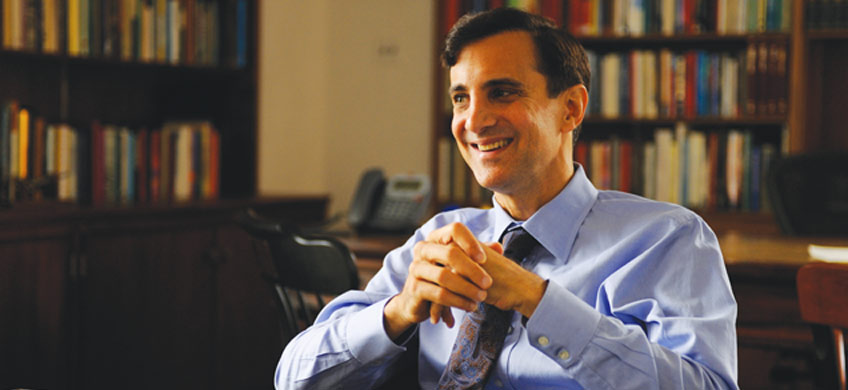
(page 2 of 3)
In 1998, management consultant Peter Drucker said that he thought the traditional Western university would be obsolete by 2028. As president, how do you go about effecting change so that Drucker’s prediction doesn’t come true?
Let me start by saying that I see very little evidence of Drucker’s prediction coming true. In fact, just the opposite. Our institutions—that is to say, the research-intensive university—have never been more important. We live in a world in which knowledge creation is at the core of our society. Rather than becoming anachronistic or marginal to society, we stand at the very core of it. We are simply society’s most important institution, not just a source of ideas but a source of independent criticism. We are a great change-agent in terms of our capacity to lift people up from their circumstances and give them remarkable opportunities to change their trajectories in life. This is the great engine of social transformation that is the modern university.
What a president can do is to challenge, to inspire, to support scholarly and educational innovation. Elaborating just a bit, in my zeal to promote interdisciplinary collaborations, these are things not just at the level of research but also very important in terms of their linkage to the graduate and undergraduate program. We’re increasingly seeing students coming to us and saying, I want to pursue a program that straddles a number of different areas of the university. I want to pursue a program in public health at the undergraduate level that not only exposes students to a lot of the work that’s being done at the Bloomberg School but also allows them to cobble that experience together with work in international relations on the Homewood campus, or in economics, so they can understand the challenges in global health in a broad frame.
As I emphasized during my installation address, in our zeal to foster a spirit of interdisciplinary collaboration and marshal resources in the service of understanding phenomena that aren’t restricted to one particular discipline, it’s important to maintain the discipline of the disciplines. That is, disciplines have existed in some cases for centuries, and they are very powerful ways of organizing research and teaching. So although we want to foster collaboration, we don’t want to see the disciplines impaired by that exercise. Just the opposite. We want disciplines to grow strong from interdisciplinary collaborations, and those collaborations to be stronger because of the methodological rigor that the disciplines bring.
What I think is very powerful about Johns Hopkins is this spirit that I’ve talked about before, in terms of the entrepreneurial character of the institution and the ways in which colleagues within particular departments and schools have been able to work to advance the mission of their departments or schools. And I think what is interesting is that colleagues are understandably proud of their affiliation with particular schools within the university. For me, what I’m hoping I can work with colleagues to do is to foster a sense of pride with their affiliation not just with a school that happens to be at Johns Hopkins University but with the idea of the university as a whole.
You’ve expressed the need for Johns Hopkins in its admissions to become need blind. What about that matters so much to you, and what needs to be done?
Right now, if you look at the top 15 research universities in the United States, we are one of two that are not need blind at the present time. To my mind, that’s an issue that requires urgent rectification.
What we are as an institution, how we pursue our academic mission, turns intimately on the quality of the people that we bring to this university, at all levels, and ensuring that we have an environment here that is enriching and rewarding to them. When it comes to students, of course, the question is, are we in a position to recruit students on the basis of their merits, or are we limited in our capacity to do that because of our challenges in providing appropriate financial aid? I am really struck by a lot that has happened over the last several decades in terms of enriching our financial aid program. But the reality is we stand out right now as being an institution that is need aware but not need blind, meaning that our financial aid resources are unable to allow us to recruit without regard to the financial wherewithal of the students whom we regard as most meritorious. That’s something that impairs the strength of the institution. It’s important in terms of what we are as an institution that we understand that admission to Hopkins is based on the ideals of merit and not the absence of financial wherewithal.
